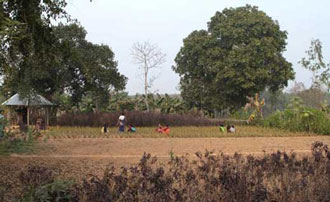Citizen Declaration and Recommendations Regarding the Rights of the Chaks
This citizen declaration and recommendations regarding the rights of the Chaks was adopted at the launching of photography exhibition and seminar, “Ambushed by Greed: The Chak Story” held at Drik Gallery, Dhaka on 23 June 2011.
We, the participants at the launching of photography exhibition and seminar “Ambushed by Greed: The Chak Story” organized by Society for Environment and Human Development (SEHD), are aware of the gradual loss of the traditional land rights of the Chaks, a small indigenous community of the Chittagong Hill Tracts (CHT). We express our full support for the social, political, and economic rights of the Chaks.
We observe with great concern that the Chaks, who primarily reside in the secluded areas of the Naikhongchhari upazila, are now severely marginalized due to various external pressures.
We are disheartened to see that it is primarily due to rubber and tobacco cultivation that the Chaks are losing their jum land and even homestead. As a result they have become further impoverished and their social and economic security has been jeopardised due to the internal migration of Bangali outsiders.
We have noticed with great regret that during the 1980s and 90s that approximately 45,000 acres of land in the Bandarban Sadar, Lama, Alikadam and Naikhongchhari upazilas have been leased mostly to the influential Bangali outsiders. The Chaks have lost their vast jum land from leasing the land for rubber and horticulture. In addition, rubber and tobacco cultivation funded by multinational company from the mid-90s has been expanding ever since and led to many Chak villages in Naikhongchhari losing their precious plain land. Both rubber and tobacco have proven to degrade the hilly environment and geography of the region. Despite their destructive impacts on the environment and the livelihood of the Chaks, both cultivations are expanding.
We are aware that Gha 8 of the CHT Peace Accord, on the issue of land allocation for rubber and other plantation, states that “Out of the lands allotted to non-tribal and non-local persons for rubber and other plantations, the lease (allocation) in respect of the lands of those who did not undertake any project during the last ten years or did not properly utilize the lands shall be cancelled.”
Although the government cancelled the lease of some 569 plots for violating lease agreements, the Bandarban District Administration acknowledged in 2011 that 35 of them were later reinstated. There is also no information if any of the leaseholders whose lease was cancelled actually surrendered their plot, or if the district administration took back the plot. The district administration also said that some 100 writ petitions were filed in the higher court challenging the cancelation of leases.
We have regretfully observed that contrary to the democratic values, the government administration, non-government organizations and multinational companies are continually encouraging activities that severely threaten the livelihood of the indigenous population. The government and the non-government bodies, through various means, continue to encourage Bangali settlement, not only in the Chak inhabited areas, but also in the entire hill tracts region. The hill land is being encroached on, and conflicts increase between the hill people and the Bangalis. Unable to resist the pressure from the mainstream Bangalis, many are resorting to silent migration from their land.
This declaration and recommendation named “The 2011 Citizen Declaration and Recommendations regarding the Rights of the Chak” is adopted, and presented with hope that the state will understand and recognize the current marginalized state and problems of the Chak population, and take necessary measures to provide them with legitimate protection of their human rights.
Recommendations:
- Safe rehabilitation of the Chaks displaced from Longodujhiri (Khal) Chak Para must be ensured. This requires the Bandarban Deputy Commissioner to work with the mouza headman in order to take necessary actions.
- The illegal clearing of forests for rubber plantations in Baishari Mouza and Alekhyong Mouza of the Naikhongchhari Upazila and other areas in Bandarban Hill District inhabited by the Chak and Marma must be halted immediately. The names of the leaseholders and those who have had their leased deeds for plots cancelled must be published. The government must reach an effective decision regarding the cancelled plots.
- The government must adopt adequate policies to halt the invasion of tobacco plantations and take strict measures in controlling this environmentally disastrous cultivation. The government should also provide all necessary assistance for the hill people to continue with their traditional environmentally friendly cultivation without disruption.
- The traditional rule of circle chiefs, headman and karbari of the Chittagong Hill Tracts must be strengthened. In defiance of these tradition institutions, the civil administration exercises undisputed authority, that in turn results in hill land disputes, encroachments, and displacement of the hill people. The headman and the circle chiefs must be consulted before leasing land. Land that has been leased without the consent of the headmen must be terminated. The Rubber Standing Committee must also be terminated.
- The legal rights of the hill people who were allotted land for homestead and rubber cultivation under the Upland Resettlement Project initiated by the Chittagong Hill Tracts Development Board (CHTDB) are yet to be recognized. The CHTDB must take appropriate action to rectify this and hand over the titles of this land as quick as possible.
- The unrestricted expansion of the rubber and tobacco is rapidly annihilating the desolate hill forests of Naikhongchhari Upazila. This is affecting the Chaks most. The government needs to take action to protect the forest.
- The influx of the Myanmar refugees has to be prevented. Those settled must be identified and removed.
- The hill people’s much coveted Regional Council has turned out to be an ineffectual institution as a consequence of not implementing the CHT Accord. There is no other option than to agree to the CHT Accord in order to ensure the security of the land and the lives of the hill people.
- The three hill district councils have been run by the same government nominated individuals for a long time; the district councils should immediately be reorganized with elected representatives.
- Although the CHT Land Dispute Commission has been reformed, it has been incapable of making any substantial contribution. The current chairman of the commission has been rejected by the leading hill people, thus the Land Commission needs further reorganization. The land commission laws need to be amended and rules formulated.
- The National Committee, created for implementation of the CHT Accord, is yet to take any positive and effective measures. Affirmative actions taken by the committee in realizing the CHT Accord will contribute significantly in resolving the existing land disputes and in providing security to the hill people.
Participants and signatories to declaration: Brother Jarlath D’Suza, BICPAJ; Prof. Niaz Zaman, University Of Dhaka; Asif Iabal, SAMATA; Dhung Cha Aung Chak, Baishari, Naikhyangchari; Babul Chandra Sutradhar, Dhaka; Shai Hla Ching, Baishari, Dr. Mahfuzul Haque, University of Dhaka; Sanjib Basak Dainik Shamokal, Dhaka; Lucille Sircar, ADRA Bangladesh, Dhaka; Prof. Amena Mohsin, University of Dhaka; Dilshad Mahmud, BRAC, Dhaka; Fazley Hassan Rabbi, Student, SMUCT, Dhaka; Raton Jakaria Malo, Student, Dhaka University; Nusrat Ara, Nijera Kori, Dhaka; Obaidul Haque, associate professor, University of Dhaka; Archita Baroi, New Age, Dhaka; Atish Saha, student, Patshala, Dhaka; SK Ali, Dainik Jugantar, Dhaka; Mahtabi Zaman, The Daily Star, Dhaka; Amir Tuhin, American Institute of Bangladesh Studies (AIBS), Dhaka; Tania M, American Institute of Bangladesh Studies (AIBS), Dhaka; Pobitro Gregory, Saint Joshep High School, Dhaka; Mong Mong Chak, Bandarban; Kishor Kumar, Bhorer Kagoj, Dhaka; Masud Parvej, Bhorer Kagoj, Dhaka; Mehedi Noor Akter Priti, Artist, Dhaka; Khya Ching Chak, Naikhyongchori; Monangrai, Baishari; Chai Mra Prue Chak, Baishari; Chanu Mong Chak, Naikhyongchori; Buddyojyoti Chakma, Dainik Prothom Alo, Bandarban; Siko Khumi, Roangchori, Bandarban; Aung Thoai Chak, Uporchakpara, Baishari; Ma Shu Chak, Baishari; Aung Ga Mey, Baishari; Mong Kaw Bing Chak, Naikhyongchori; Mong Chainda Chak, Naikhyongchori; Nainda Aung Chak, Naikhyongchori; M.A. Prue Chak, Naikhyongchori; Ching La Mong Chak, Naikhyongchori; Dr. Uttam Kumar Das, SAILS, Dhaka; Aung Thoai Ching Chak, Naikhyongchhori; Ranglai Mro, Bandarban; Inamul Kabir, Janakantho, Dhaka; Mehedi Jaman, Jai Jai Din, Dhaka; Akter Hossain, BDO Naogaon; Raphael Palma, Dhaka; Sajjad Hussain, Transparency International Bangladesh, Dhaka; Dipan Dandy, Jai Jai Din, Dhaka; Goutam Dewan, Movement for the protection of forests and land rights in CHT, Rangamati; Sudatta Bikash Tanchangya, Movement for the protection of forests and land rights in CHT, Rangamati; Mong Chanu Hla Chak; Khushi Kabir, Nijera Kori, Dhaka; Abir Abdullah, Patshala South Asian Media Academy, Dhaka; Zuamlian Amlai, Bawm Social Council, Bandarban; AKM Mofizur Rahman, Community Public Library, Dhaka; Babul Bairagi SEHD; Shanjida Khan Ripa, SEHD; Lucky Ruga, SEHD; Partha Shankar Saha, SEHD; Khokon Suiten Murmu, SEHD; Shekhar Kanti Ray, SEHD; Philip Gain, SEHD; Md. Saifullah Safi, SEHD; Biswajit Sen Roy, Student, Dhaka University; Lisa Chambugong, Student, Dhaka; Shanta Mallick Bonnya, Student, Dhaka; S.N Obaidul Muktadir, SEHD; and Prosad Sarker, SEHD.


 For the first time ever, an international designer (Vivienne Westwood) and an international fashion magazine (Marie Claire) have joined forces, to launch an exciting global project that both drives awareness of deforestation and influences the current trend of up-cycling your clothes.
For the first time ever, an international designer (Vivienne Westwood) and an international fashion magazine (Marie Claire) have joined forces, to launch an exciting global project that both drives awareness of deforestation and influences the current trend of up-cycling your clothes.
